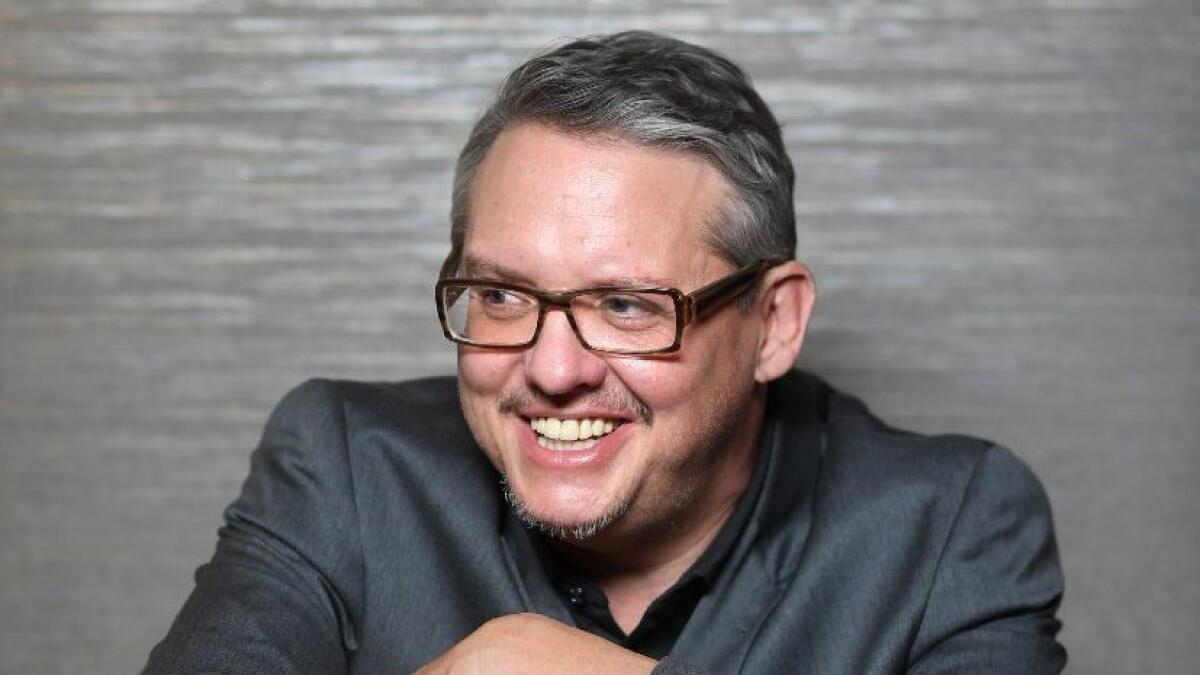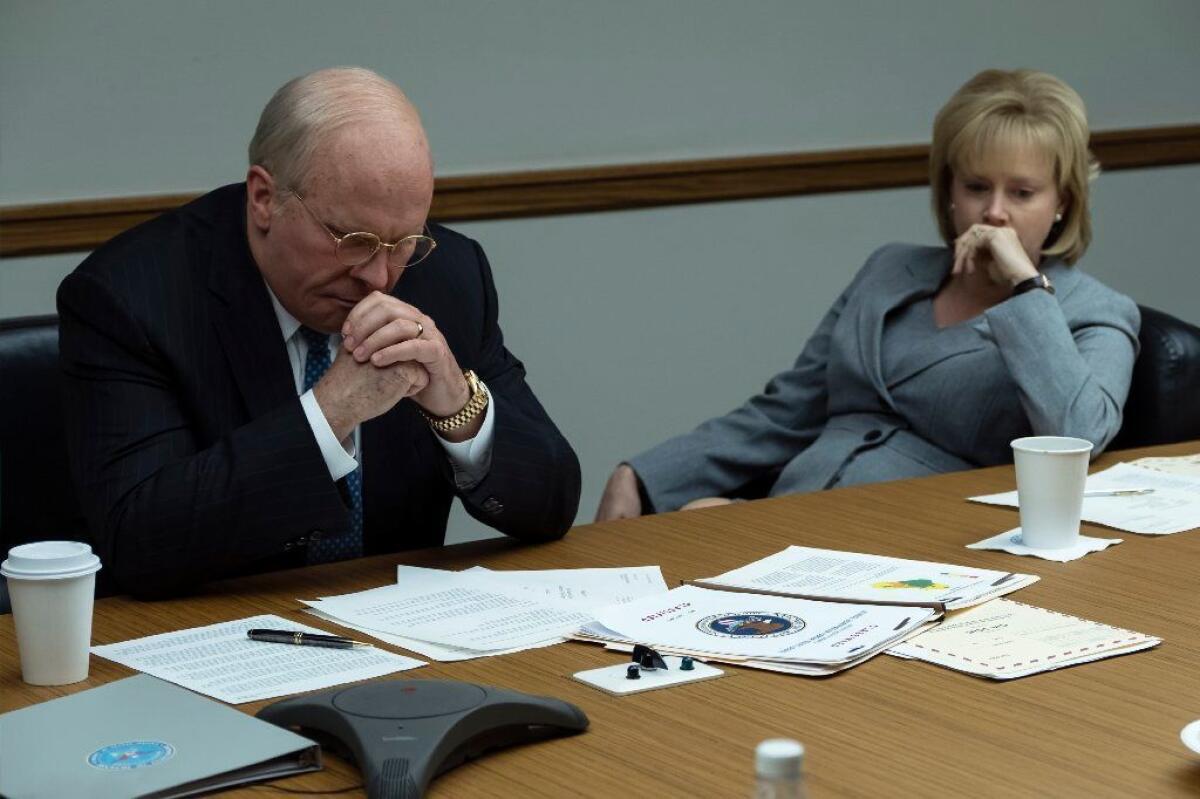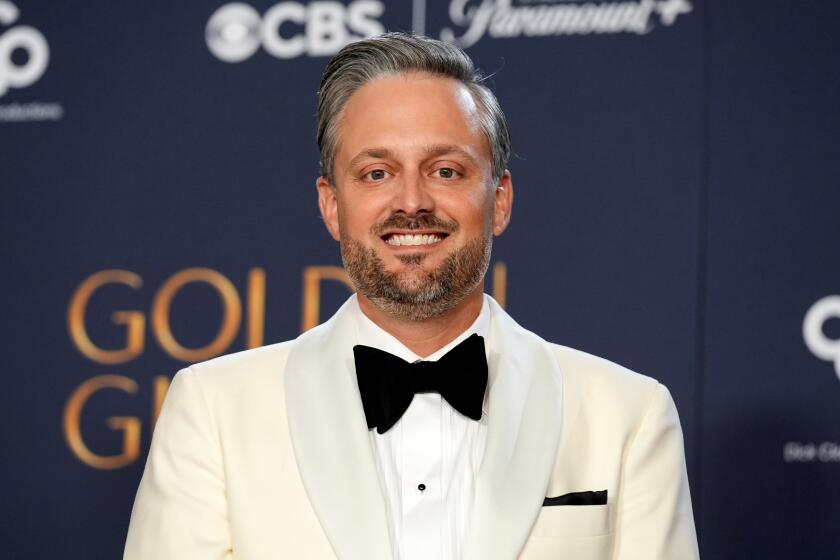Q&A: Adam McKay turns his lens on Dick Cheney and the ugly twists of power in ‘Vice’

- Share via
Adam McKay has a copy of Jill Lepore’s acclaimed, 960-page American history volume, “These Truths: A History of the United States,” sitting on the corner of his desk. I have a copy too, lying on my nightstand, silently judging me the past couple of weeks for barely reading it. And because McKay’s new movie, “Vice,” suggests that American indifference helps politicians like Dick Cheney get away with torture and murder, I’m feeling doubly implicated by my failure to feed my mind and burrow into Lepore’s book.
“I haven’t opened it either,” McKay says, laughing, adding that, by way of contrast, he could tell me all about the Milwaukee Bucks’ season, down to the fact that, apparently, Khris Middleton isn’t playing enough defense lately for the basketball team. “It shows you how tired I’ve been. When I get home, I just want to watch basketball or ‘Antiques Roadshow.’”
McKay’s exhaustion comes from the years he spent making “Vice,” an ambitious movie about the life of Dick Cheney and the corrupting power of politics. Like “The Big Short,” a freewheeling and scorching look at the 2008 financial crisis that won McKay the Oscar for adapted screenplay, “Vice” employs an array of audacious approaches to present unappealing subject matter — in this case, one of the most disliked politicians in American history — with an entertaining energy that might entice audiences.

FULL COVERAGE: Get the latest on awards season from The Envelope »
The approach has divided critics, with some dismissing “Vice” as shallow and glib. McKay is undaunted.
“The goal was to make a movie that’s informative and empowering, that has the same stickiness to it as something like ‘Goodfellas’ or ‘Jaws,’ where if you flip past it five years from now, you’re watching at least 10 or 15 minutes of it.”
Sprawled on the sectional sofa in his office in the Funny or Die production company building in West Hollywood, McKay spoke at length about Cheney and “Vice,” which earned a leading six Golden Globes nominations — best picture comedy, nods for Adam McKay’s direction and screenplay, and acting recognition for Christian Bale, who plays Cheney; Amy Adams who plays his wife, Lynne; and Sam Rockwell as George W. Bush.
Early in the film, Cheney’s interning with Donald Rumsfeld and he asks Rumsfeld, “What do we believe?” And Rumsfeld just laughs at him. You didn’t find any core ideology with these guys?
Not really. It’s always about simultaneously expanding and hanging onto power. Cheney’s dad was an FDR Democrat. His mom too. Certainly in the early days, ideology wasn’t driving him. It was more making something of himself. He wanted in on the action. Rumsfeld was the same way. Rumsfeld was against the Vietnam War because it was a good way to counter [Henry] Kissinger. He wanted to take Kissinger out. Then later he was hawkish with the Ford administration when Kissinger was trying to negotiate a missile treaty with the Russians. So when you look at these guys, it’s hard to find an ideological throughline.
Reading the film, you believe Cheney was more motivated by making his wife proud.
We were joking about it. [Screenwriting gurus] Syd Field and Robert McKee will talk about your first act and providing an inciting incident for your character. Honestly, Cheney’s inciting incident is one and the same with Lynne’s: when she reads him the riot act after his DUI.
Without Lynne, you don’t have Dick Cheney. If they don’t meet, Dick Cheney is a lineman in Wyoming with a bunch of kids and you never hear his name. Maybe he runs for some state office at most. But we interviewed some people from the town, and they still say to this day that anyone Lynne Cheney married would have been president or vice president.
Positions which, with Cheney and Bush, seemed interchangeable. The film does show Lynne to be formidable. Watching Amy Adams play her, I’d occasionally think of her character in “The Master.”
If Lynne’s born and raised in a more progressive state, I don’t think there’s any question she becomes a congresswoman or a tough-as-nails governor. But Wyoming at the time was very conservative, probably a couple of decades behind the country.
Their love story is part of the engine that drives the movie, which makes some people mad. They think you’ve gone too soft on Cheney.
My whole idea was to understand how power can twist someone. I think by the end, the movie’s a grand tragedy. I think he’s given everything away. I don’t think that’s going soft on someone at all, saying that he ends with an emptiness. His family is split apart. His country is split apart. And it was all for this power they were chasing that metastasized by the end.
I don’t know. You see him today and he doesn’t strike me as someone burdened with regret.
Well, you see him out there now, and he just kind of repeats his talking points. I feel like he’s more a shell of a man. He’s going to defend his legacy, and he’s going to push [daughter] Liz [Wyoming’s lone representative in the House] up the Republican hierarchy. To me it feels like a rickety clock just hitting the second hand over and over.
Whereas there were points in his life when he was secretary of defense, when he did a pretty good job, and he could have left with a full family and good public record. In the end, he just gave it away.
Without going into specifics, the movie tries to give him that happy ending. Do you think he would have been more content if things had turned out that way and he hadn’t taken that call from Bush to run on the ticket?
It’s impossible to know for sure. My opinion is yes. They were a big, unified family. They were very wealthy. They had a beautiful house. He had a nice public record. It seems like that would have been a good time. Now his daughters have a very fractured relationship — because of politics. [During a failed 2014 Senate bid, Liz said she opposed same-sex marriage. Cheney’s younger daughter, Mary, is gay and has been married to her wife since 2012.]
In a way, that’s what happened to our country as well. That wedge issue actually wedged their own family. And you think of all the other families that has happened to. To me, it feels like high tragedy.
The movie I really looked at was “The Godfather Part II” where you see the warmth of the father, De Niro playing the young Vito, balanced against Michael with those dead eyes, closing the door on Diane Keaton. A lot of these stories about power happen around the family table. And here you have this family that’s ambitious and wanted good things, and then somewhere along the line for the good of the family, you have to destroy the family. When I discovered that doing the research, I knew I had a movie.
Hasn’t your own family been divided by politics?
I’ve lived it. My mom and her husband are very right-wing, Fox News, pro-Trump. They never talked a lot about “The Big Short.” Kind of everyone hates banks. [Laughs] Banks don’t poll very well. But Cheney was polling under 20% when he left office. When we did our test groups, there were Republicans who were OK with the movie.
I wonder though in our current political climate how many will actually buy tickets to see your movie.
I do think there’s going to be a surprising chunk of Republicans who go watch this. It’s not like Cheney is some beloved, cuddly figure in the Republican party.
Who might you call a cuddly figure in the Republican party?
[Laughs] That’s a good one. It’s not Mitch McConnell. It’s not Paul Ryan. It’s not Orrin Hatch, is it? [John] McCain had his moments before he passed away. John Kasich? Close? On a really cold night. [Laughs]
But back to who sees the movie — far more people saw “The Big Short” after it left theaters. You come across it on cable or streaming, it lets people relax. We find it with our comedies; people see them in a different way years later.
It feels like I could find that Baby Jesus scene from “Talladega Nights” on cable no matter the time of day or night if I look long enough for it.
To this day, I still say that’s the best scene I’ve ever directed. And that scene’s really long — like seven and a half minutes.
You give Cheney the last word in the movie. When he looks in the camera and says, “It has been my honor to be your servant. You chose me and I did what you asked,” who’s he talking to? Who’s the “you” in that?
There’s a lot of ways to interpret it. “You chose me by not caring. You chose me by abdicating your choice.” The “you” in it, I like the idea that “you” is not really the people, it’s power. “I serve you, power. And you chose me and I did it all for you, power.” Nebulous, shapeless power. Some sort of William Blake abstract painting of power.
You note too in the movie that people are working longer hours for less pay these days. And, as we talked about, sometimes you’re too tired to think about whether a sitting president can be indicted.
We used to have unions which would marry your work and politics so the two would be the same. You’d be at work and there would be some discussion of government. Unions created the middle class in America, and the greatest legacy of America, the reason all the other countries give a crap about us, is that we created the first sizable middle class. And they took it apart by targeting unions. In the 1970s, 27 percent of the workforce belonged to unions. Now it’s 6 percent. That’s a massive change. So people are being paid less money, they’re not getting health care and they have to work two or three jobs. And, good Lord, the last thing you want to do when you come home is turn on the BBC World News to find out what happened at the G-20 summit.
So what do you hope those people might take away from “Vice” if they see it?
My hope is this movie can weather these times we’re living in. We’re going into different territory here because this right-left craziness is so embedded. This guy, Duncan Hunter, got caught red-handed, and what does he say? It was a liberal conspiracy. And he got re-elected. That was shocking to me.
So I just hope the movie can leave that junk behind and become what it is, which is just a portrait of a man, a portrait of power, a portrait of the times. And, no, it doesn’t have Will Ferrell praying to Baby Jesus. But it does have Christian Bale and Amy Adams — two of the greatest actors on the planet — conversing in iambic pentameter for three minutes as Dick and Lynne Cheney. I think that’s a pretty fair trade.
More to Read
From the Oscars to the Emmys.
Get the Envelope newsletter for exclusive awards season coverage, behind-the-scenes stories from the Envelope podcast and columnist Glenn Whipp’s must-read analysis.
You may occasionally receive promotional content from the Los Angeles Times.







